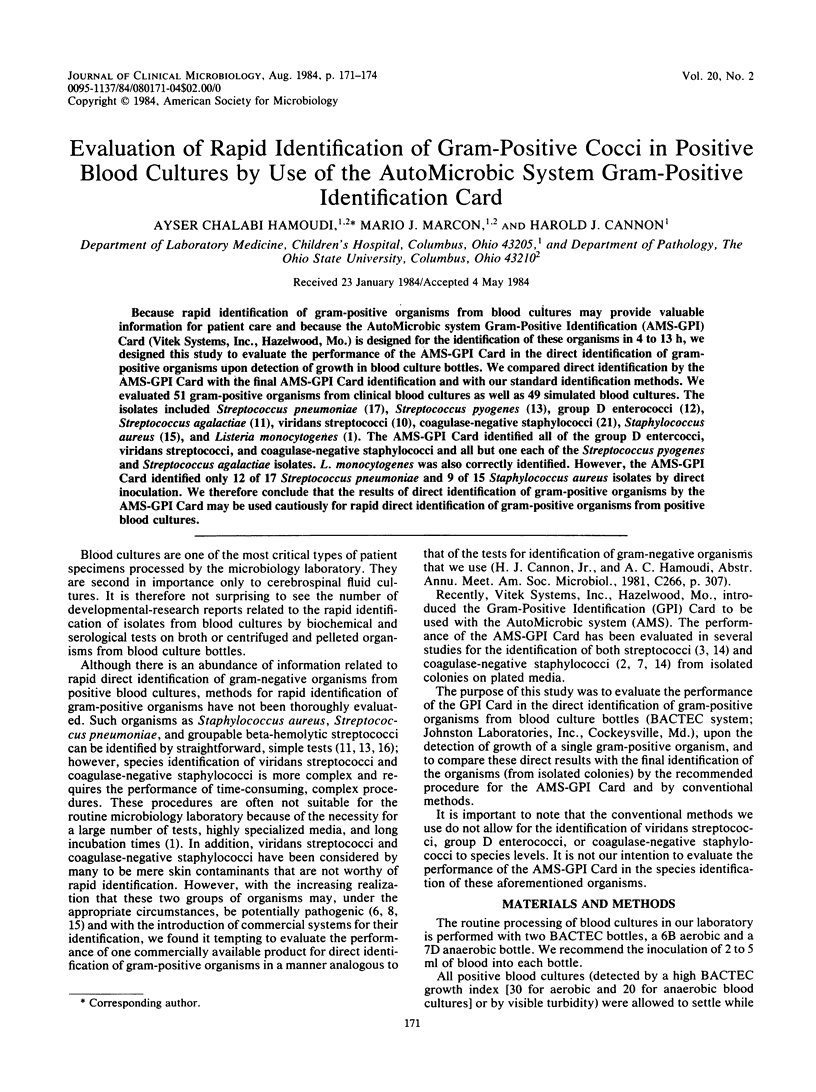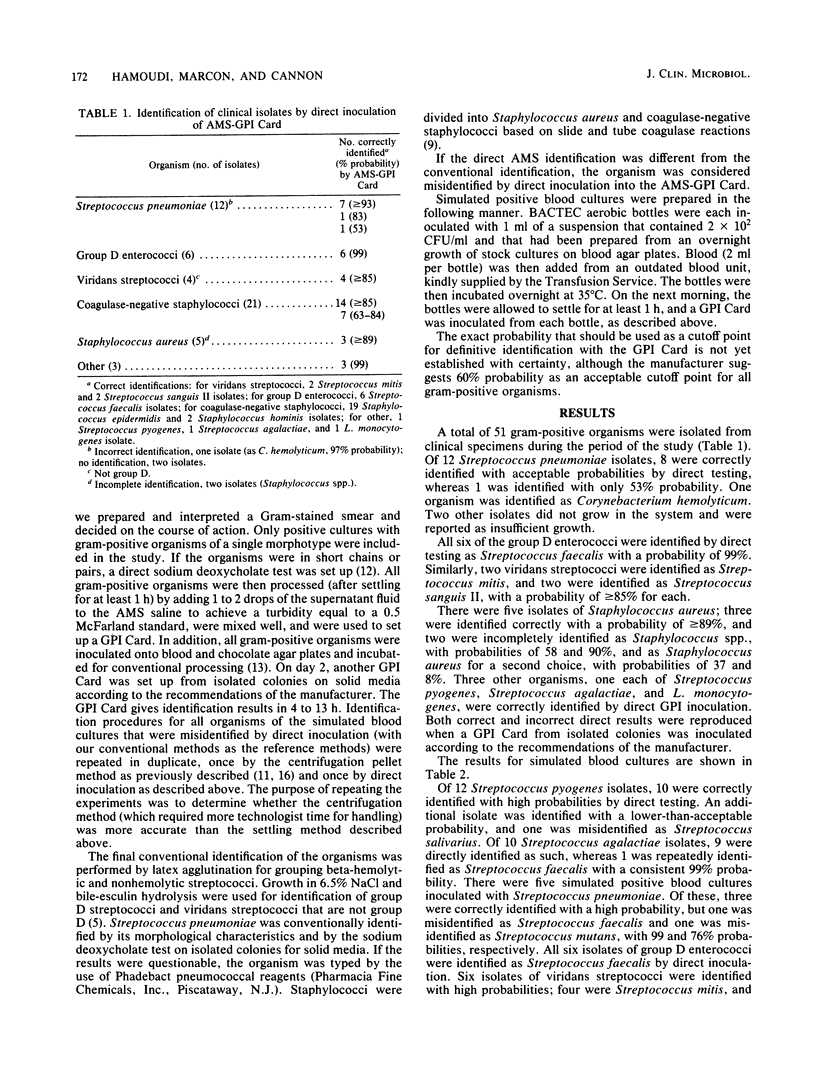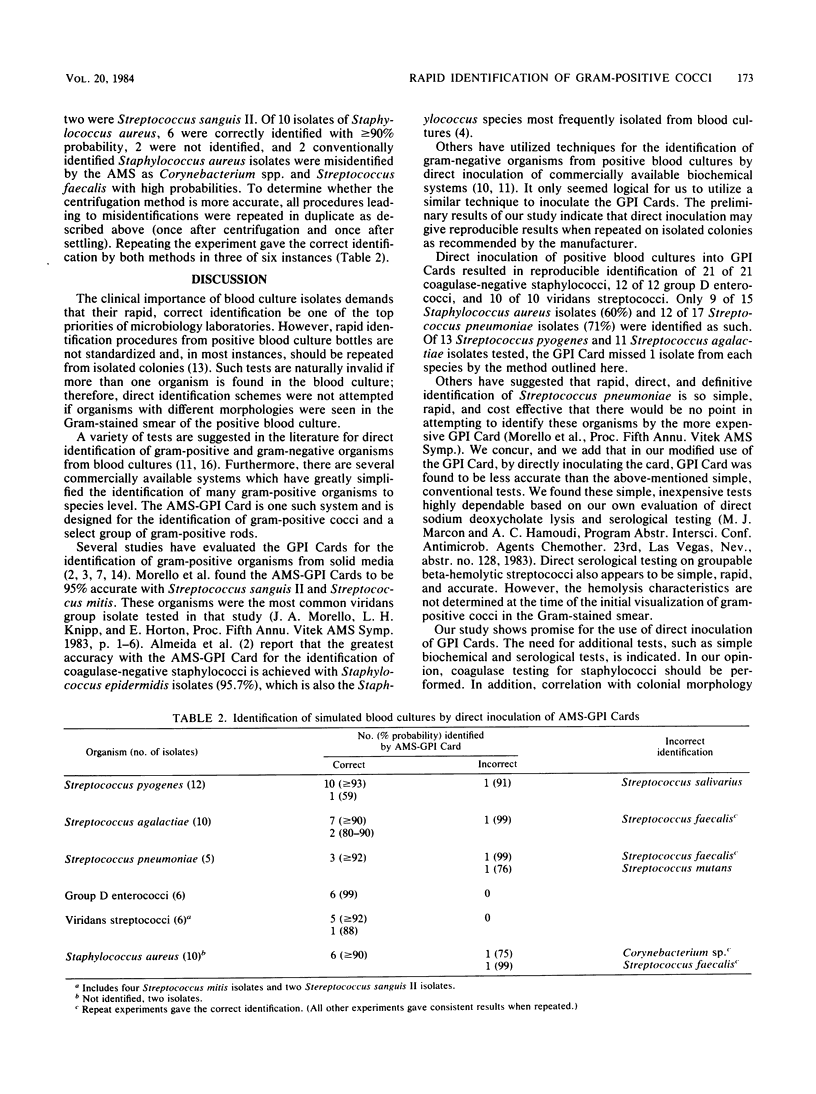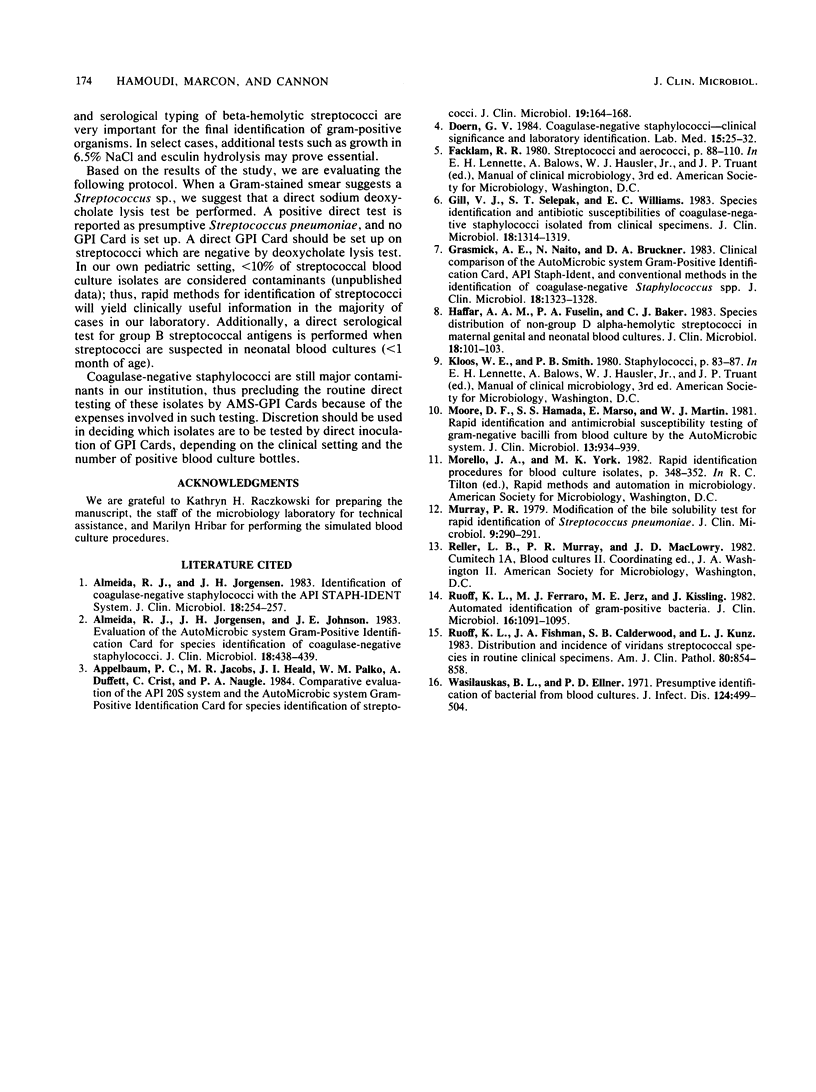Abstract
Because rapid identification of gram-positive organisms from blood cultures may provide valuable information for patient care and because the AutoMicrobic system Gram-Positive Identification (AMS-GPI) Card (Vitek Systems, Inc., Hazelwood, Mo.) is designed for the identification of these organisms in 4 to 13 h, we designed this study to evaluate the performance of the AMS-GPI Card in the direct identification of gram-positive organisms upon detection of growth in blood culture bottles. We compared direct identification by the AMS-GPI Card with the final AMS-GPI Card identification and with our standard identification methods. We evaluated 51 gram-positive organisms from clinical blood cultures as well as 49 simulated blood cultures. The isolates included Streptococcus pneumoniae (17), Streptococcus pyogenes (13), group D enterococci (12), Streptococcus agalactiae (11), viridans streptococci (10), coagulase-negative staphylococci (21), Staphylococcus aureus (15), and Listeria monocytogenes (1). The AMS-GPI Card identified all of the group D enterococci, viridans streptococci, and coagulase-negative staphylococci and all but one each of the Streptococcus pyogenes and Streptococcus agalactiae isolates. L. monocytogenes was also correctly identified. However, the AMS-GPI Card identified only 12 of 17 Streptococcus pneumoniae and 9 of 15 Staphylococcus aureus isolates by direct inoculation. We therefore conclude that the results of direct identification of gram-positive organisms by the AMS-GPI Card may be used cautiously for rapid direct identification of gram-positive organisms from positive blood cultures.
Full text
PDF



Selected References
These references are in PubMed. This may not be the complete list of references from this article.
- Almeida R. J., Jorgensen J. H. Identification of coagulase-negative staphylococci with the API STAPH-IDENT system. J Clin Microbiol. 1983 Aug;18(2):254–257. doi: 10.1128/jcm.18.2.254-257.1983. [DOI] [PMC free article] [PubMed] [Google Scholar]
- Almeida R. J., Jorgensen J. H., Johnson J. E. Evaluation of the automicrobic system gram-positive identification card for species identification of coagulase-negative staphylococci. J Clin Microbiol. 1983 Aug;18(2):438–439. doi: 10.1128/jcm.18.2.438-439.1983. [DOI] [PMC free article] [PubMed] [Google Scholar]
- Appelbaum P. C., Jacobs M. R., Heald J. I., Palko W. M., Duffett A., Crist R., Naugle P. A. Comparative evaluation of the API 20S system and the automicrobic system gram-positive identification card for species identification of streptococci. J Clin Microbiol. 1984 Feb;19(2):164–168. doi: 10.1128/jcm.19.2.164-168.1984. [DOI] [PMC free article] [PubMed] [Google Scholar]
- Gill V. J., Selepak S. T., Williams E. C. Species identification and antibiotic susceptibilities of coagulase-negative staphylococci isolated from clinical specimens. J Clin Microbiol. 1983 Dec;18(6):1314–1319. doi: 10.1128/jcm.18.6.1314-1319.1983. [DOI] [PMC free article] [PubMed] [Google Scholar]
- Grasmick A. E., Naito N., Bruckner D. A. Clinical comparison of the AutoMicrobic system gram-positive identification card, API Staph-Ident, and conventional methods in the identification of coagulase-negative Staphylococcus spp. J Clin Microbiol. 1983 Dec;18(6):1323–1328. doi: 10.1128/jcm.18.6.1323-1328.1983. [DOI] [PMC free article] [PubMed] [Google Scholar]
- Haffar A. A., Fuselier P. A., Baker C. J. Species distribution of non-group D alpha-hemolytic streptococci in maternal genital and neonatal blood cultures. J Clin Microbiol. 1983 Jul;18(1):101–103. doi: 10.1128/jcm.18.1.101-103.1983. [DOI] [PMC free article] [PubMed] [Google Scholar]
- Moore D. F., Hamada S. S., Marso E., Martin W. J. Rapid identification and antimicrobial susceptibility testing of gram-negative bacilli from blood cultures by the AutoMicrobic system. J Clin Microbiol. 1981 May;13(5):934–939. doi: 10.1128/jcm.13.5.934-939.1981. [DOI] [PMC free article] [PubMed] [Google Scholar]
- Murray P. R. Modification of the bile solubility test for rapid identification of Streptococcus pneumoniae. J Clin Microbiol. 1979 Feb;9(2):290–291. doi: 10.1128/jcm.9.2.290-291.1979. [DOI] [PMC free article] [PubMed] [Google Scholar]
- Ruoff K. L., Ferraro M. J., Jerz M. E., Kissling J. Automated identification of gram-positive bacteria. J Clin Microbiol. 1982 Dec;16(6):1091–1095. doi: 10.1128/jcm.16.6.1091-1095.1982. [DOI] [PMC free article] [PubMed] [Google Scholar]
- Ruoff K. L., Fishman J. A., Calderwood S. B., Kunz L. J. Distribution and incidence of viridans streptococcal species in routine clinical specimens. Am J Clin Pathol. 1983 Dec;80(6):854–858. doi: 10.1093/ajcp/80.6.854. [DOI] [PubMed] [Google Scholar]
- Wasilauskas B. L., Ellner P. D. Presumptive identification of bacteria from blood cultures in four hours. J Infect Dis. 1971 Nov;124(5):499–504. doi: 10.1093/infdis/124.5.499. [DOI] [PubMed] [Google Scholar]


